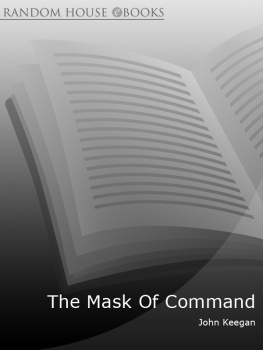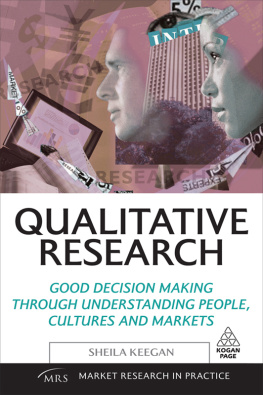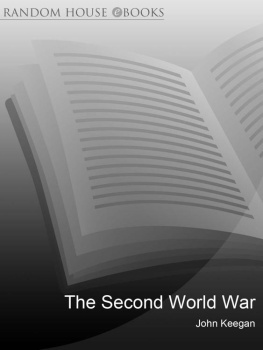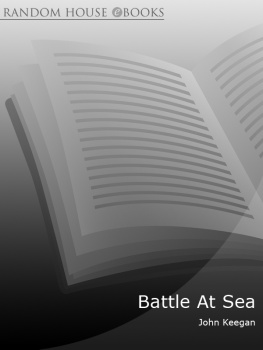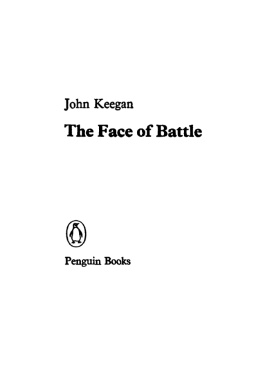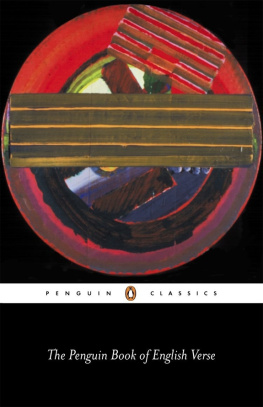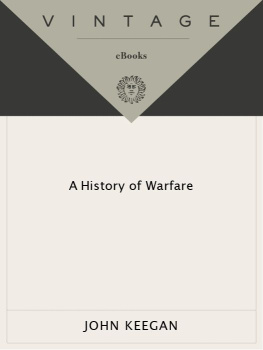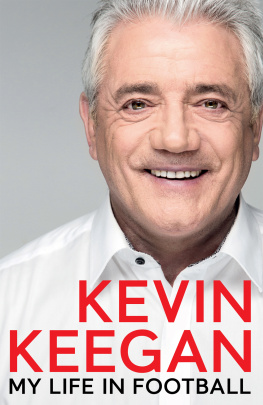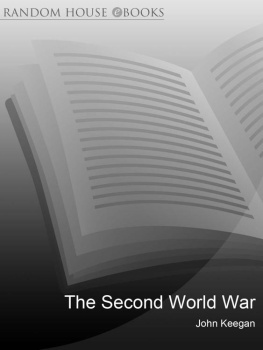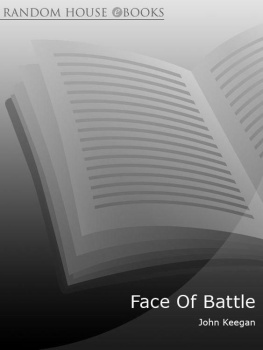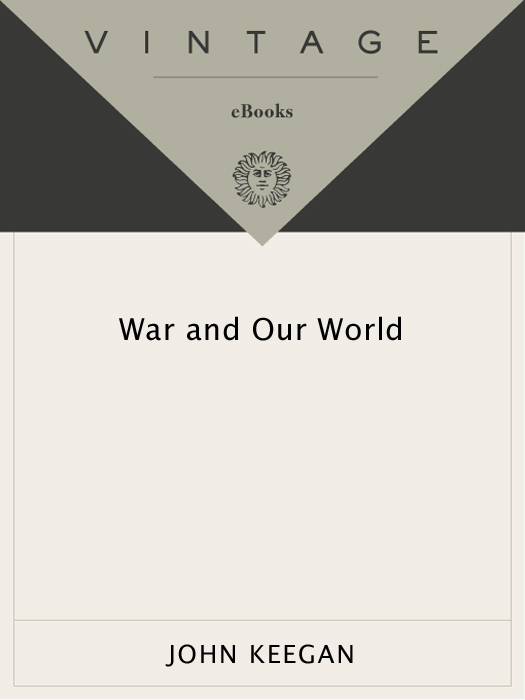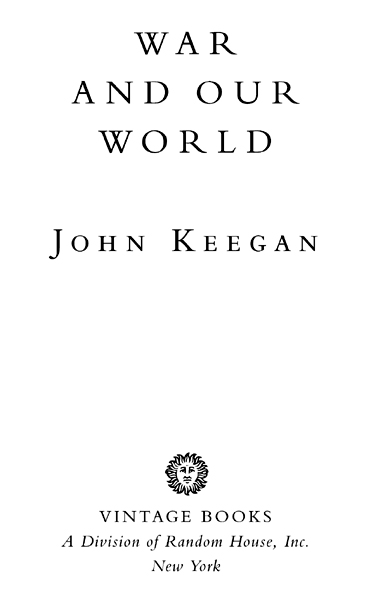John Keegan was for many years senior lecturer in military history at the Royal Military Academy, Sandhurst, and has been a fellow at Princeton University and a professor of history at Vassar College. He is the author of fourteen previous books, including the acclaimed The Face of Battle and The Second World War and, most recently, The First World War, a national bestseller. In May 2000 he was knighted for services to military history. He lives in Wiltshire, England.
ALSO BY J OHN K EEGAN
The Face of Battle
The Nature of War (with Joseph Darracott)
World Armies
Whos Who in Military History (with Andrew Wheatcroft)
Six Armies in Normandy
Soldiers (with Richard Holmes)
The Mask of Command
The Price of Admiralty
The Second World War
A History of Warfare
Fields of Battle
The Battle for History
The First World War
FIRST VINTAGE BOOKS EDITION, JUNE 2001
Copyright 1998 by John Keegan
All rights reserved under International and Pan-American Copyright Conventions. Published in the United States by Vintage Books, a division of Random House, Inc., New York. Originally published in hardcover in Great Britain by Hutchinson, London, in 1998.
Vintage and colophon are registered trademarks of Random House, Inc.
Library of Congress Cataloging-in-Publication Data
Keegan, John, 1934
War and our world / John Keegan.
p. cm. (The Reith Lectures ; 1998)
Originally published: London : Hutchinson, 1998.
eISBN: 978-0-307-77999-1
1. War and society. 2. War. I. Title. II. Series.
HM554.K44 2001
303.66dc21 00-067410
www.vintagebooks.com
v3.1
A CKNOWLEDGEMENTS

I am grateful to all those at the BBC who helped in the preparation and delivery of these lectures, particularly Anne Winder, Head of Topical Features, Keith Jones, my endlessly painstaking producer, Anne Smith, his assistant, Carole Haynes, who arranged for the invitation of the audiences and James Boyle, who extended to me the invitation to deliver the 1998 Reith Lectures in the first place. I would also like to thank the outside broadcasting teams who recorded the lectures at the Royal Institution, the Royal Military Academy Sandhurst, Kings College London and the University of Glasgow, and the Commandant, Principal and Vice-Chancellor of the last three who welcomed the BBC to their institutions.
Mrs Lindsey Wood typed and edited the manuscripts and, as always, I give her my deepest thanks. I would also like to thank my editor at Hutchinson, Anthony Whittome, who arranged for the publication of the lectures in this form and against severe pressure of time. My wife and children know my gratitude to them.
For permission to quote the poem To My Son by Rudyard Kipling, the author and publishers thank A. P. Watt acting for the National Trust.
C ONTENTS

C HAPTER O NE
War and Our World
C HAPTER T WO
The Origins of War
C HAPTER T HREE
War and the State
C HAPTER F OUR
War and the Individual
C HAPTER F IVE
Can There Be an End to War?
I NTRODUCTION

W HY WAR ? T HE QUESTION IS double-edged. I do not know why men fight wars, though I make an attempt to sketch an answer in the pages that follow. Why the 1998 Reith Lectures are about war is more easily explained. When, to my great surprise, James Boyle, the Controller of BBC Radio 4, asked me, in the spring of 1997, to deliver the lectures, he began by leaving the subject to my choice. I reflected at length and proposed some ideas at our second meeting. None, at least directly, was about war. After hearing me out, he said gently that he thought I would find I would speak best about what I knew best. So war was selected as the subject.
Yet I do not, of course, know about war in any direct way at all. Disabled by a childhood illness, I have not served in any of the armed forces and my exposure to the scenes of war have been brief and distant. As a war correspondent I visited the Lebanon in 1983 and the Gulf before the outbreak of the fighting in 1990, and I have also reported from Northern Ireland, the North-West Frontier and South Africa during times of troubles. Except in the Lebanon, I was never in the slightest danger. My knowledge of war is therefore second-hand and academic, largely acquired in the library of the Royal Military Academy Sandhurst during the years I spent there between 1960 and 1985, teaching military history to the future officers of the British Army.
Sandhurst was, nevertheless, a true education in war. The spirit and routine of the Academy taught me military discipline, for we worked long hours to a strict timetable which did not indulge the individual. The day was not nine-to-five nor were the weekends necessarily ones own. During one period of reorganisation, even annual leave was abolished. I thus learnt that, in the army, time to oneself is a privilege, not a right, and that duty to the institution takes precedence over other obligations.
I would in any case have learnt that from the company of the soldiers who were my colleagues. In the 1960s Sandhurst was staffed by officers who had fought either in the Second World War or in the campaigns that followed it. Most had decorations for bravery in the face of the enemy. They were a light-hearted collection of human beings, with a refreshingly self-confident attitude to authority. To the principle of authority and to the demands it made on their lives, they shared, however, an automatic respect. Having braved death and seen men die, they understood in their bones that it was only the habit of obedience and the automatic performance of orders that made an army work and spared life that would be lost by prevarication or dispute. Their ethic was even stronger than that. Professional officers, I learned to recognise, regarded the discharge of duty as a matter of personal honour. To fail in duty was to dishonour themselves as individuals and, by extension, the body of comrades to which they belonged. Dishonour was so disgraceful that it was preferable to risk death itself rather than be marked by that taint.
To the question Why war?, therefore, Sandhurst supplied the answer that the professional soldiers of constitutional states fight wars because it is their duty to do so. That was not an answer to the larger question, Why do wars happen at all? There are few constitutional states in the world, fewer that maintain professional armies and, among those, still fewer that observe the high standards of duty and morality characteristic of the British in our time. Historically, war has been a dirty business, in which professional armies have been minority participants. If we date the origin of war to the fourth millennium BC , most of the wars fought in the ensuing five thousand years have made little place for the man of honour, the high-minded warrior. The aristocrat in arms, the knight of chivalry, the gentleman officer figure prominently in the chronicles of war, whether they come down to us from the early Chinese empire, the high Middle Ages or the dynastic conflicts of monarchical Europe. All have been outnumbered by the brutish rank-and-file, the conscript dolt, the mercenary, the free-booting predator of the cavalry horde or the raiding longship.


